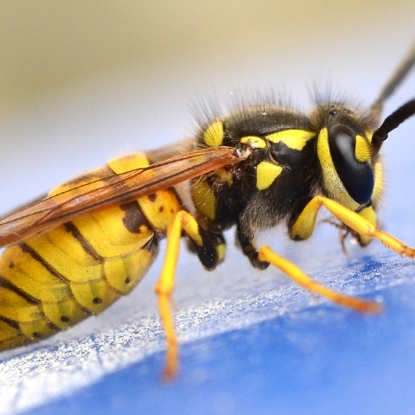
Stinging Insects

About
What are stinging insects?
Bees and wasps are examples of stinging insects. As their name describes, stinging insects use their stingers to defend themselves when they feel threatened. Both bees and wasps are responsible for pollinating a wide variety of plants and crops. Wasps are a predatory species, helping to keep populations of nuisance insects in check. Bees and wasps are active during the end of summer and in early fall, when colonies are at their peak numbers and are out and about foraging for food.
Another common stinging insect in Texas is the scorpion. Scorpions are nocturnal predators. They hunt and feed on spiders, centipedes, insects, and other scorpions.
Are stinging insect dangerous?
Stinging insects are dangerous pests, and care should be taken around them. Venom from bees, wasps, and scorpions is strong enough to cause serious health consequences in people. Not all stinging insects are aggressive, but when they feel threatened or are being directly handled, they will sting to defend themselves.
These stings can be painful, and usually leave behind a large, red welt. The venom of stinging insects is strong enough to trigger a severe allergic reaction in some people that can lead to anaphylaxis and the need for immediate medical attention.
Why do I have stinging insects?
Stinging insects are attracted to properties that offer plentiful food sources and a suitable place to build a nest or burrow. Stinging insects, depending on their exact species, feed on a variety of things including insects, proteins, nectar, sweets, and honeydew.
Properties that have open garbage cans, compost piles, gardens, flowering vegetation, wood piles, mulch, tree stumps, clogged gutters, bird baths, clogged gutters, and ponds are attractive to stinging insects.
Where will I find stinging insects?
Typical outdoor nesting spots for bees, wasps, and other stinging insects include:
- Rock crevices
- Trees
- Utility poles
- Rock overhangs
They may also build their nests underneath porches, decks, and roof eaves. Inside, bees and wasps create nests in attics, crawl spaces, chimneys, and in vents.
Scorpions prefer to live in warm, dry environments. They like to nest outside under the ground in soil, behind loose tree bark, and in tree stumps. Scorpions often find their way inside homes, garages, sheds, and other buildings accidentally while out foraging for food. Inside, scorpions can be found hiding underneath blankets and linens, inside bathtubs, and scaling the walls of dark, quiet rooms.
How do I get rid of stinging insects?
To control and eliminate stinging insects that have taken up residence in your home or business, we recommend hiring a pest control company that specializes in stinging insect control. At Pest-Pro Services, Inc., we've been helping property owners get rid of bees, wasps, and other stinging insects since our founding and have the tools and expertise necessary to rid their properties of stinging insects.
With service available throughout Northeast Texas and Southwest Arkansas, Pest-Pro Services, Inc. is committed to eliminating stinging insects. Reach out today to schedule your free inspection!
How can I prevent stinging insect problems?
In combination with professional pest control services from Pest-Pro Services, Inc., there are a few steps you can take around your Texas home and property to make it less attractive to stinging insects:
- Caulk any holes found in the foundation and exterior walls of your home.
- Fill in spaces found around utility lines and pipes entering your home through exterior walls.
- All outdoor trash cans should have tight fitting lids on them to prevent stinging insects from foraging for food.
- Clean up all leftover food and drinks after eating outside.
- Remove old trees and trees stumps from your property.
- Remove excess piles of debris like wood piles, rock piles, and leaf piles from your property.
- Plant flowers and flowering vegetation on your property away from your home.
- Keep gutters maintained, and repair leaky fixtures and pipes.